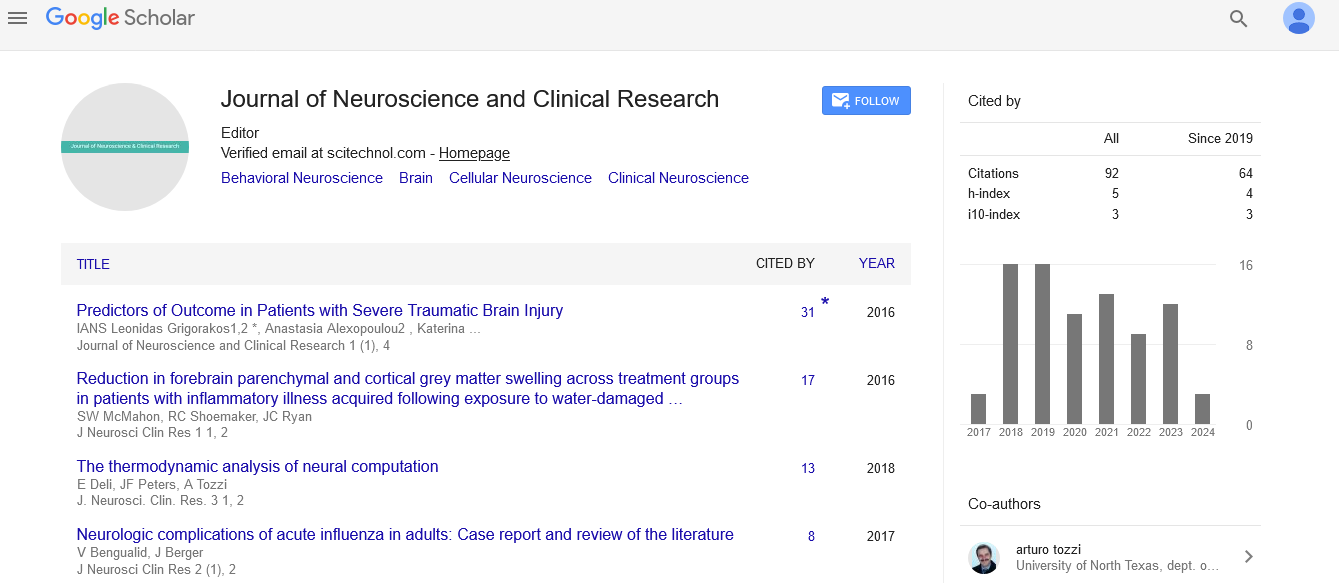New lifestyle: Coping support techniques and positive psychology as best prevention dealing with stress
Javier Fiz Perez
European University of Rome, Italy
: J Neurosci Clin Res
Abstract
Stress is no longer a phenomenon that concerns adults exclusively. For this reason, we have decided to include teenage stress in our research. We have been submitting a survey on stress to a group of 671 teenagers with an average age of 16 years and 7 months. The survey was focused on two different aspects: Stress perception and stress causes. Family Support Coping Questionnaire was also submitted. The main finding of this study is that 38% of the sample defines them as stressed, with no gender related differences. Subjects that consider themselves stressed indicate as causes lack of time (31%) and excessive commitments (23%). Almost all the subjects say school (48%), family (21%) and sentimental relationships (8%) are the main sources of stress. From the analysis of the open answers, it is clear that family and school expectations are the greatest sources of stress – even if significantly more so for females than for males. Subjects were asked to assess the level of stressed originated by finishing school and the need of choosing and planning their future. This finding is meaningful when measured up to the percentage of subjects that has stated to have already made the decision of what to do when they finish studying. As it is seen in the graphic (we asked the subjects to state if they had already decided what to do after school) the greatest levels of uncertainty are found in year IV. The intersection of these data does not seem, however, enough to explain levels of stress, as the high percentage of students who have decided should cause a significant reduction of stress in year V. Most likely, stress concerning the post high school choice is the nonlinear combination of two factors: on one hand, uncertainty regarding the choice, on the other hand, the immediacy of the event. Comparing stress levels amongst subjects that count on strong family support and subjects that count on scant family support there are significant differences. The subjects that count on strong family support seem to register lower average stress levels, regarding their post high school choices. Furthermore, this kind of support seems to reduce stress as the event comes nearer, facilitating the decision-making.
Biography
Javier Fiz Perez is the psychotherapist and professor of Psychology at the European University of Rome, where he cooperates also as Delegate for the International Research Development. He is co-director of the Laboratory of Applied (Business and Health Lab). Graduated in Philosophy, Psychology and Social Bioethics, getting also a specialization in Executive Business Administration (EMBA) after the PhD He’s a member of the Advisory Board of the Academic Senate of the Academia Tiberina. He is the coordinator of the Scientific Committee of The International School of Economics and Ethics (Italy) and collaborates with the International Academy for Economic and Social Development (AISES) of which he has been vice president for Spain and Latin America. He is also the Scientific Research Director of the European Institute of Positive Psychology at Madrid (IEPP) being also a member of the Scientific Committee of International Institute Jacques Maritain. He is also a member of several Committees of Scientific Journals and the Director of the International Network for Social and Integrated Development (INSID). He has more than 150 national and international publications.
E-mail: Javier.fizperez@unier.it
 Spanish
Spanish  Chinese
Chinese  Russian
Russian  German
German  French
French  Japanese
Japanese  Portuguese
Portuguese  Hindi
Hindi 